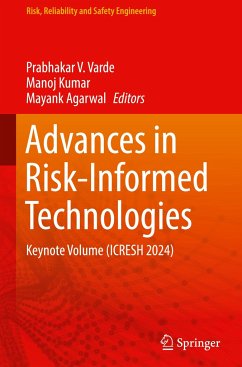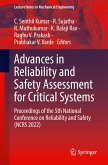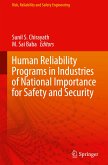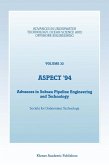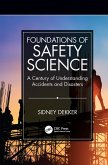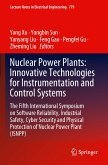Advances in Risk-Informed Technologies
Keynote Volume (ICRESH 2024)
Herausgegeben:Varde, Prabhakar V.; Kumar, Manoj; Agarwal, Mayank
Advances in Risk-Informed Technologies
Keynote Volume (ICRESH 2024)
Herausgegeben:Varde, Prabhakar V.; Kumar, Manoj; Agarwal, Mayank
- Gebundenes Buch
- Merkliste
- Auf die Merkliste
- Bewerten Bewerten
- Teilen
- Produkt teilen
- Produkterinnerung
- Produkterinnerung
This book presents the latest research in the areas of development and application of risk-informed and risk-based technologies. The book discusses how advances in computational technologies, availability of accumulated experience and data on design, operations, maintenance and regulations, new insights in human factor modelling and development of new technologies, such as physics-of-failure modelling, prognostics and health management, have paved the way for implementation of risk and reliability tools and methods. The book will be useful for researchers, academicians, and engineers,…mehr
Andere Kunden interessierten sich auch für
![Advances in Reliability and Safety Assessment for Critical Systems Advances in Reliability and Safety Assessment for Critical Systems]() Advances in Reliability and Safety Assessment for Critical Systems112,99 €
Advances in Reliability and Safety Assessment for Critical Systems112,99 €![Human Reliability Programs in Industries of National Importance for Safety and Security Human Reliability Programs in Industries of National Importance for Safety and Security]() Human Reliability Programs in Industries of National Importance for Safety and Security82,99 €
Human Reliability Programs in Industries of National Importance for Safety and Security82,99 €![Accidents and Disasters Accidents and Disasters]() Satish ChandraAccidents and Disasters34,99 €
Satish ChandraAccidents and Disasters34,99 €![International Virtual Conference on Industry 4.0 International Virtual Conference on Industry 4.0]() International Virtual Conference on Industry 4.0208,99 €
International Virtual Conference on Industry 4.0208,99 €![Aspect ¿94 Aspect ¿94]() Aspect ¿9475,99 €
Aspect ¿9475,99 €![Foundations of Safety Science Foundations of Safety Science]() Sidney DekkerFoundations of Safety Science181,99 €
Sidney DekkerFoundations of Safety Science181,99 €![Nuclear Power Plants: Innovative Technologies for Instrumentation and Control Systems Nuclear Power Plants: Innovative Technologies for Instrumentation and Control Systems]() Nuclear Power Plants: Innovative Technologies for Instrumentation and Control Systems112,99 €
Nuclear Power Plants: Innovative Technologies for Instrumentation and Control Systems112,99 €-
-
-
This book presents the latest research in the areas of development and application of risk-informed and risk-based technologies. The book discusses how advances in computational technologies, availability of accumulated experience and data on design, operations, maintenance and regulations, new insights in human factor modelling and development of new technologies, such as physics-of-failure modelling, prognostics and health management, have paved the way for implementation of risk and reliability tools and methods. The book will be useful for researchers, academicians, and engineers, particularly the field engineers, designers and regulators working on complex engineering systems.
Produktdetails
- Produktdetails
- Risk, Reliability and Safety Engineering
- Verlag: Springer / Springer Nature Singapore / Springer, Berlin
- Artikelnr. des Verlages: 978-981-99-9121-1
- 1st edition 2024
- Seitenzahl: 180
- Erscheinungstermin: 8. Januar 2024
- Englisch
- Abmessung: 241mm x 160mm x 16mm
- Gewicht: 442g
- ISBN-13: 9789819991211
- ISBN-10: 9819991218
- Artikelnr.: 69449528
- Herstellerkennzeichnung
- Springer-Verlag GmbH
- Tiergartenstr. 17
- 69121 Heidelberg
- ProductSafety@springernature.com
- Risk, Reliability and Safety Engineering
- Verlag: Springer / Springer Nature Singapore / Springer, Berlin
- Artikelnr. des Verlages: 978-981-99-9121-1
- 1st edition 2024
- Seitenzahl: 180
- Erscheinungstermin: 8. Januar 2024
- Englisch
- Abmessung: 241mm x 160mm x 16mm
- Gewicht: 442g
- ISBN-13: 9789819991211
- ISBN-10: 9819991218
- Artikelnr.: 69449528
- Herstellerkennzeichnung
- Springer-Verlag GmbH
- Tiergartenstr. 17
- 69121 Heidelberg
- ProductSafety@springernature.com
Prof. Prabhakar V. Varde started his carrier at Bhabha Atomic Research Centre in 1983 as nuclear engineering trainee of BARC Training School in 27th Batch and joined erstwhile Reactor Operations and Maintenance Group now Reactor Group and served initially as commissioning and later operations engineering for Dhruva - a 100 MW research reactor at BARC and rose through the administrative ladder and retired in 2019 as Associated Director, Reactor Group. During his service, he completed his Ph.D. from IIT, Bombay in 1996 in AI based operator advisory system and later focused his research on nuclear safety in general and Risk-based engineering in particular, while working for reactor related services responsibilities. Alongside his regular duties he continued R&D in the area of Risk and Reliability and Academics. He also served as Senior Professor, Guide and Member of the Board of Studies in Engineering Sciences of Homi Bhabha National Institute, Mumbai. He also served as Indian specialists / experts, to International Atomic Energy Agency (IAEA), Vienna, and Nuclear Energy Agency (OECD/NEA) France. He has been on select Panel for recruitment / promotions and Ph.D. and M.Tech. Examiner at IITs and Universities. He did his postdoctoral research at KAERI, South Korea and served as Visiting Professor at CALCE University of Maryland, USA. He has over 250 research publications at national and international level which also includes co-authored / edited 18 books, technical reports and proceedings. Recently, he has published a book entitled 'Risk-conscious Operations Management'. He received many awards and recognition. Presently, he is serving as DAE Raja Ramanna Fellow, at BARC. He is founder of (Society for Reliability & Safety) and presently serving as President, SRESA and Editor-in-Chief for SRESA's Int. Journal for Life Cycle Reliability and Safety. Dr. Manoj Kumar received his B. Tech. (Electronics & Communication) from JMI, N. Delhi (1998) and Ph. D. (Engg.) from IIT Bombay (2008). He has been with Control Instrumentation Division of Bhabha Atomic Research Centre (BARC), Mumbai as Scientific Officer since 1998. He is currently working in the area development & dependability analysis of computer based systems for safety applications and prognostics of electronic systems. He is associated with BRNS (Board of Research in Nuclear Science) in its activities as project collaborator and reviewer. He is also associated with HBNI (Homi Bhabha National Institute) as guide for its post graduate programs. He has over 30 research papers to his credit and has supervised fifteen M. Tech. thesis. He has authored two books in the area of dependability modelling and accelerated life testing of electronic systems. At present he is guiding one Ph.D. candidate of HBNI in the area of prognostics of electronic systems. He is on the editorial board of three international journals and managing editor of Journal - Life Cycle Reliability and Safety Engineering. He was also the member of working group for IEEE Std1856-2017 (IEEE standard Framework for Prognostics and Health Management). Mayank Agarwal is a mechanical engineer. After successful completion of training from 51st batch of BARC training school, he joined Bhabha Atomic Research Center, Mumbai. completed his M. Tech in Nuclear Science Engineering. As part of his M. Tech. thesis he worked on a project on development of a prototype of a Risk Monitor named as 'Risk-based Operation and Maintenance Management System'. He also worked with a team involved in developing a risk-based approach for regulatory re-licensing of a reprocessing plant. Based on the experience and research insights, he also contributed as to writing a departmental report and finally co-authored a paper on the subject in a reputed international journal. He is working as Mechanical Maintenance Engineer for a Research Reactor at Bhabha Atomic Research Reactor. He has expertise in maintenance of Safety and Safety Related Equipments, HVAC system of nuclear facilities and Fuelling Machine.
Technology Empowered Risk and Reliability Management of Engineering Assets-possibilities and Challenges.- Standards for Probabilistic Risk/Safety Assessments of Nuclear Power Plants and High-level Safety Goals -An Overview.- Asset Management Can Be an Umbrella to Business for Reducing Cost and Risks and Enhancing Performance.- Harnessing Ai for Reliability and Maintenance.- Mirce Science: Solar Storm as a Mechanism of Motion of Autonomous Systems Through Mirce Space.- The Development of the Integrated System Failure Analysis and Its Application.- Digital Twins: Definition, Implementation and Applications.- Digital Twins for Rams.- Stochastic Debugging Framework for Software Reliability Growth Modelling and Its Inter-disciplinary Nature.- Human Factors Engineering, Product Development and Sustainable Performance in Organizations: Issues and Challenges from an International Perspective.- Advancements in Safety Assessment Methods and Techniques for Analysis of Internal and External Hazards.- Integrated Approach to Nuclear Safety at NPCIL.
Technology Empowered Risk and Reliability Management of Engineering Assets-possibilities and Challenges.- Standards for Probabilistic Risk/Safety Assessments of Nuclear Power Plants and High-level Safety Goals -An Overview.- Asset Management Can Be an Umbrella to Business for Reducing Cost and Risks and Enhancing Performance.- Harnessing Ai for Reliability and Maintenance.- Mirce Science: Solar Storm as a Mechanism of Motion of Autonomous Systems Through Mirce Space.- The Development of the Integrated System Failure Analysis and Its Application.- Digital Twins: Definition, Implementation and Applications.- Digital Twins for Rams.- Stochastic Debugging Framework for Software Reliability Growth Modelling and Its Inter-disciplinary Nature.- Human Factors Engineering, Product Development and Sustainable Performance in Organizations: Issues and Challenges from an International Perspective.- Advancements in Safety Assessment Methods and Techniques for Analysis of Internal and External Hazards.- Integrated Approach to Nuclear Safety at NPCIL.

